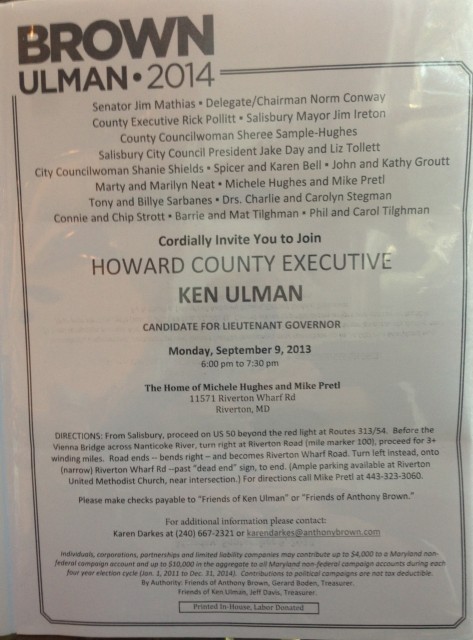Last week the state wrapped up a series of hearings on the state’s redistricting process. Unfortunately, the local hearing was neither local (held in Easton) nor convenient (held on a weekday afternoon.) While the Eastern Shore is well-ensconced in the First Congressional District, it endured plenty of change in the last state redisrtricting as boundary lines were shifted dramatically and former multi-delegate districts broken down for single delegates.
To be more specific about the points I mentioned above, the Democrats in charge of the 2010 census redisrtricting placed two Republicans in a single-member district based mainly in Somerset County. To form the revamped District 38A, they chopped off the southern portion of Wicomico County that freshman Republican Charles Otto was elected to represent in 2010 and pushed the district eastward into Worcester County to include fellow freshman GOP member Mike McDermott. Otto kept the seat in 2014, but McDermott lost a bid for Senate to incumbent Jim Mathias.
The part of Wicomico County formerly represented by Otto shifted mainly to District 37B, a fairly safe GOP district then represented by Delegates Addie Eckardt and Jeannie Haddaway-Riccio. After neither sought re-election in favor of higher office, the district became home to two freshmen Republican Delegates: Christopher Adams of Wicomico County and Johnny Mautz of Talbot County.
The rest of the old 38A was placed into a greatly diminished District 38B, one which encompassed territory from Delmar to Fruitland through the eastern half of Salisbury. Removing the rural portions of a former two-delegate seat was supposed to make it easier for incumbent Democrat Norm Conway, but he was still ousted by Republican Carl Anderton. The rest of District 38B not taken by Otto’s district was rebadged District 38C, a fairly solid Republican area now represented by Delegate Mary Beth Carozza.
The only district that stayed relatively the same was District 37A, a majority-minority district where Delegate Rudy Cane retired and left the field to freshman Democrat Sheree Sample-Hughes. As it turned out, the only incumbent Delegate to survive out of the two districts was Charles Otto. Wicomico County is now represented by five freshman Delegates, four Republican and one Democrat.
Yet the cynicism wasn’t just limited to our area. According to Delegate Jeff Ghrist, there are 71 districts that have an above-average population while 70 fall below the average. It’s just amazing that 44 of the 50 Republicans represent districts in the larger-than-average category, while 64 of 91 Democrats come from “small” districts. Given that a variation of 5% is permissible, there could be 4,000 more residents in a GOP district than a Democratic one, allowing the party in power an extra 6 or 7 seats across the state.
Ghrist also complained about the size of the districts. He lives near the border of District 36, but noted adjacent District 37B spans from Denton to the Somerset County line and from the Delaware border to the far reaches of Oxford and St. Michael’s as a two-member district. His District 36 takes in the northern part of the Eastern Shore as a three-member district. While most of the counties on the Shore are too small to support their own district, it is possible for the Shore to fill four full three-member districts with a little help from the eastern end of neighboring Harford County.
The key, though, is single-member districts. A county like Wicomico could have two members to itself, while sharing the majority-minority district in existence with Dorchester County. Geography may dictate some crossing of lines, but the districts can be made much more compact and contiguous.
Obviously Senate districts will need to span several county lines. The remedy to this is to go back to a system which, unfortunately, was dealt its mortal blow by the ill-advised passage of the Seventeenth Amendment and formally died with the Reynolds vs. Sims decision in 1964. Until then, each Maryland county had its own Senator to represent county interests. The right thing to do would be place the Senate in the hands of each county’s legislative body, allowing them to choose two (for a total of 48) and staggering the terms to having them pick a new one every two years. (Like the U.S. Senate, it would be the job of the Lieutenant Governor to break tie votes.)
If they had the cojones to challenge the 51-year-old Reynolds ruling Maryland can be a leader in moving forward into the past, restoring the original intent of our founders in balancing the interests of the people and local governments.
In part two, I want to consider our Congressional districts.


